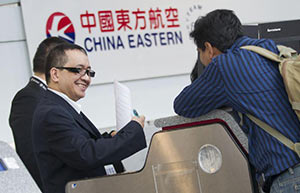Globalized RMB to stabilize world economy
(Xinhua) Updated: 2014-06-28 13:52BEIJING - The globalization of the yuan, or renminbi, will not only benefit the Chinese economy, but generate global economic stability, a senior banker said.
The yuan did not depreciate during the 1997 Asian financial crisis or the 2008 global financial crisis, helping stabilize the global economy, Tian Guoli, chairman of the Bank of China, said at a forum in London last week, according to the Friday edition of the People's Daily.
 |

|
The yuan has acquired basic conditions to become an international currency as China's gross domestic product took 12.4 percent of the world's total and its foreign trade 11.4 percent of the world's total in 2013, Tian said.
According to the central bank, yuan flow from China hit 340 billion yuan ($55.74 billion) in the first quarter of 2014, replenishing offshore yuan fluidity. The balance of offshore yuan deposits hit 2.4 trillion yuan at the end of March, 1.51 percent of all global offshore deposits. Offshore trade between the yuan and foreign currencies doubled in the first quarter from the fourth quarter of last year.
Analysts widely forecast five steps in yuan internationalization: yuan used and circulated overseas, yuan as a currency of account in trade, yuan used in trade settlement, yuan as a currency for fundraising and investment, and yuan as a global reserve currency.
Already, some neighboring countries and certain regions in developed countries are circulating yuan, indicating the first step has been basically achieved.
- London, eurozone set to benefit from increased RMB trade
- Bank of Communications approved for yuan-sterling direct trade
- Bank of China gets yuan mandate in Frankfurt
- London's RMB business keeps steady growth: report
- China starts direct yuan-sterling trade
- CCB authorized as yuan clearing bank in London
- China's building materials sector weakens
- China's 1st e-com express to debut
- China to develop high-standard farmland to ensure output
- NCSSF reports 68.6b yuan investment yields
- World Bank chief eyes cooperation with AIIB
- Beijing to build electric car charging network
- Scotland eyes closer energy cooperation with China
- China Southern opens Shenzhen-Port Louis route

















